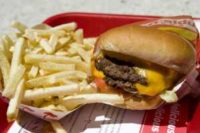
21 Jul So Far, Genes Don’t Explain How Many Calories We Consume
MedicalResearch.com Interview with:
 Dr. Christina Holzapfel PhD
Dr. Christina Holzapfel PhD
Junior Research Group Leader at
Institute for Nutritional Medicine
Technical University of Munich
MedicalResearch.com: What is the background for this study? What are the main findings?
Response: A lot of articles about genetic factors and nutritional intake have been published in the last years. Findings are inconsistent and it is not clear, whether genetic variants, especially associated with body mass index, are associated with nutritional intake.
Therefore we performed a systematic literature search in order to get an overview about the association between single nucleotide polymorphisms and total energy, carbohydrate and fat intakes. We identified about specific search terms and their combinations more than 10,000 articles. Of these, 39 articles were identified for a relationship between genetic factors and total energy, carbohydrate, or fat consumption.
In all studies, we most frequently encountered the fat mass and obesity (FTO) associated gene as well as the melanocortin 4 receptor gene (MC4R). There are indications of a relationship between these two genes and total energy intake. However, the evaluation of the studies did not provide a uniform picture. There is only limited evidence for the relationship between the FTO gene and low energy intake as well as between the MC4R gene and increased energy intake.
MedicalResearch.com: What should readers take away from your report?
Response: This systematic review identified a lot of genetic loci investigated for an association with total energy, carbohydrate or fat intake. Hence, there exist no indications that certain genetic factors are associated with the total intake of calories, carbohydrates, and fat. The current state of knowledge is still too limited for deriving individual nutritional recommendations based on genetic information, e.g. for weight management. Expert associations also agree with that statement.
MedicalResearch.com: What recommendations do you have for future research as a result of this work?
Response: Human intervention studies with detailed phenotyping, e.g. based on a genetic pre-analysis of the participants, are necessary in order to determine the interactions between genetic factors and diet on body weight.
Citation:
1- Theresa Drabsch, Jennifer Gatzemeier, Lisa Pfadenhauer, Hans Hauner, Christina Holzapfel. Associations between Single Nucleotide Polymorphisms and Total Energy, Carbohydrate, and Fat Intakes: A Systematic Review. Advances in Nutrition, 2018; 9 (4): 425 DOI: 10.1093/advances/nmy024
2- Press release of the Technical University of Munich:
https://www.tum.de/nc/en/about-tum/news/press-releases/detail/article/34824/
[wysija_form id=”3″]
[last-modified]
The information on MedicalResearch.com is provided for educational purposes only, and is in no way intended to diagnose, cure, or treat any medical or other condition. Always seek the advice of your physician or other qualified health and ask your doctor any questions you may have regarding a medical condition. In addition to all other limitations and disclaimers in this agreement, service provider and its third party providers disclaim any liability or loss in connection with the content provided on this website.
Last Updated on July 21, 2018 by Marie Benz MD FAAD
